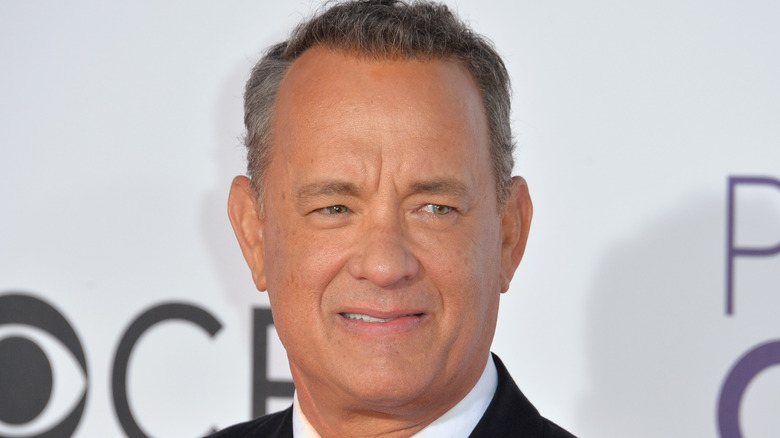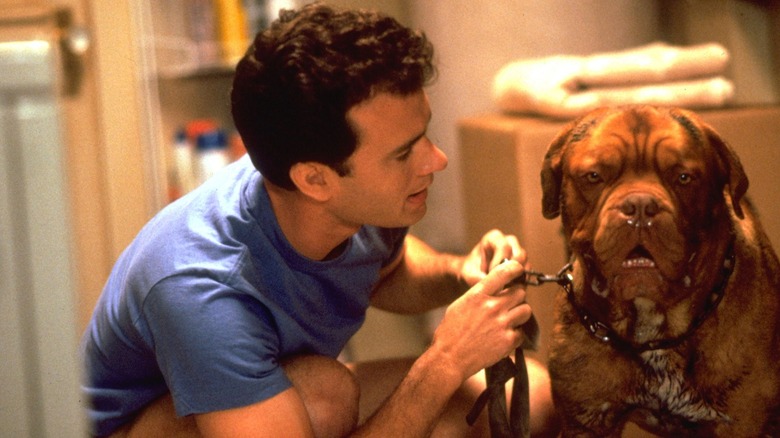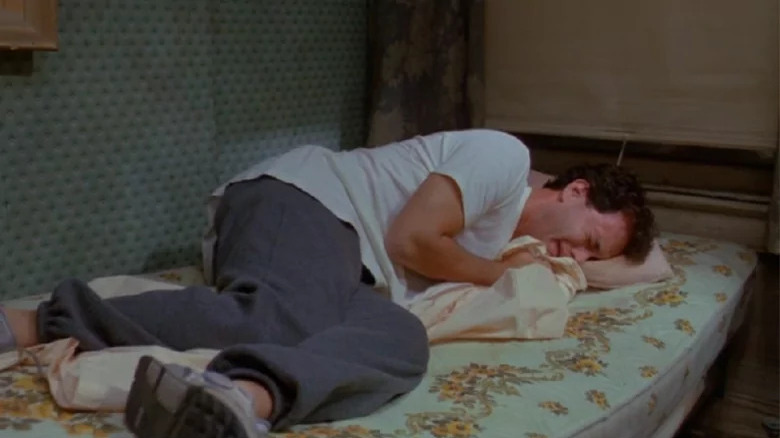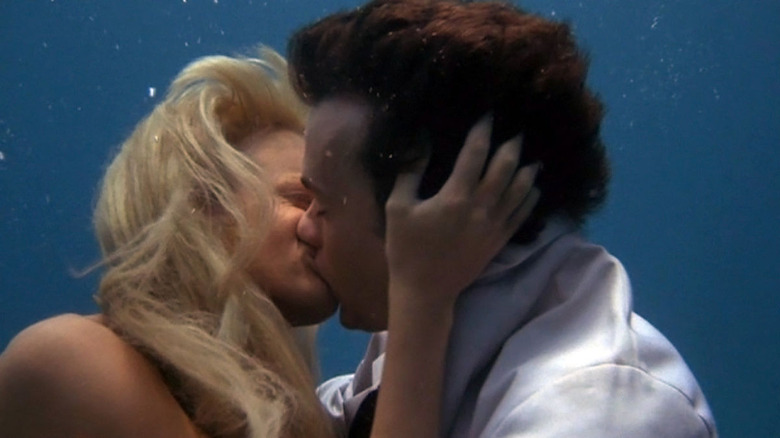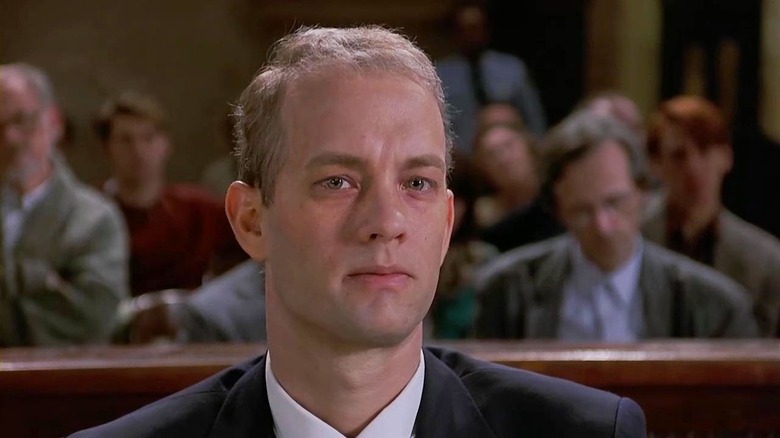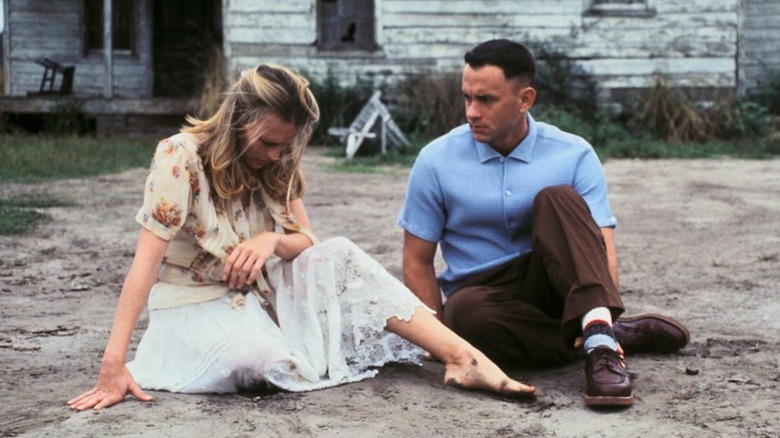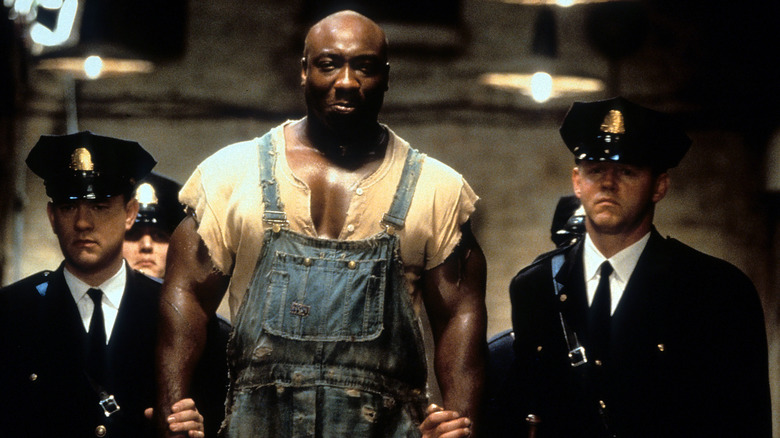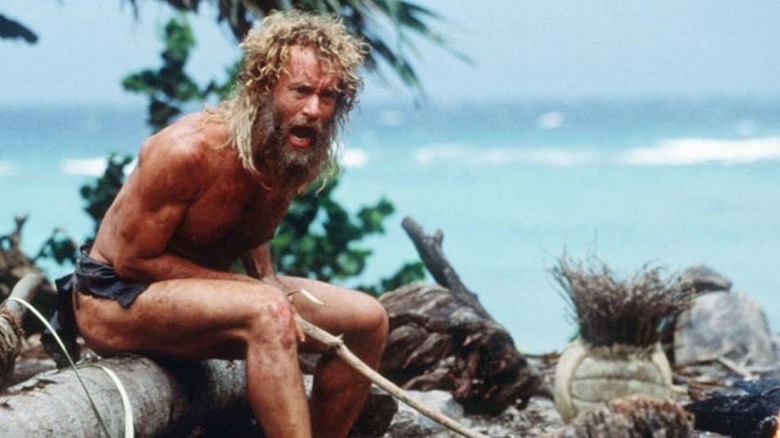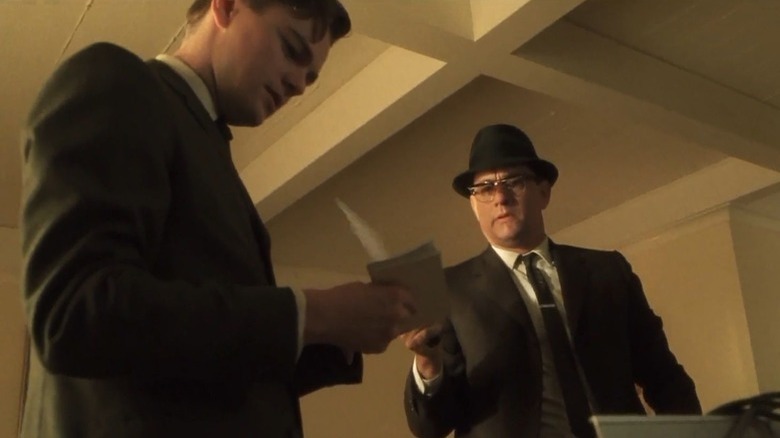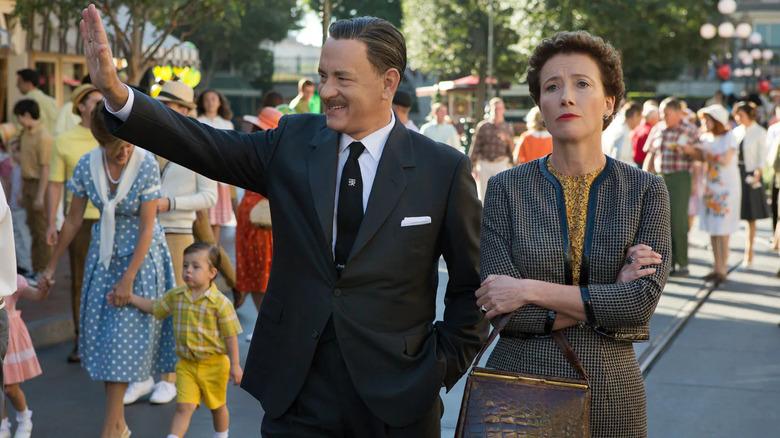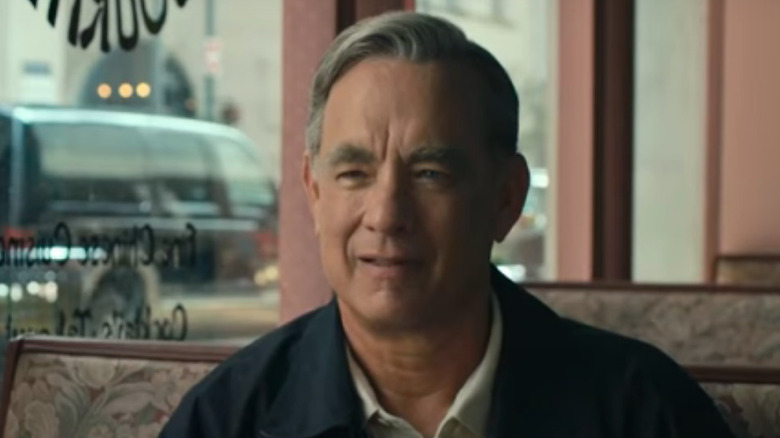Tom Hanks Movie Moments That Made Us Cry
Legendary actor Tom Hanks has been praised for decades for his ability to translate complex roles into memorable, relatable characters. According to IMDb, his filmography includes more than 90 credited roles and films in which he's appeared have earned more than $11 billion worldwide (via The Numbers). According to Forbes write Mark Hughes, Hanks' strength lies in "grounding characters as 'Everyman' so we see their simple humanity," as part of his review of "Saving Mr. Banks" — in which Hanks portrayed larger-than-life personality Walt Disney.
When pondering whether Hanks is part of a dying breed of movie star, the BBC's Christina Newland puts forth that he "has always had a disarming openness about him, with features that seem ready-made to convey a combination of sturdy heroism and a capacity for wonder." Simply put, Hanks' performances draw viewers in as eminently believable while conveying genuine human emotions, the kind that can connect with all audiences. Perhaps it's his seemingly endless capacity for empathy that resonates so strongly with us, as viewers, and we return it to Hanks' characters by forming an emotional bond.
Hanks' roles have spanned the gamut, from a naive child granted a terrific and awful wish and an idiot-savant whose life has touched historic events to a heroic pilot who saved hundreds of passengers or a prison guard who can see the humanity in a man so many have deemed a monster. Each of these roles has doubtless had its challenges but Hanks has made us feel exactly as his character does in the moment. With that in mind, we present these Tom Hanks movie moments that made us cry.
When his partner dies in Turner & Hooch
At the onset of 1989's law enforcement comedy "Turner & Hooch," Tom Hanks' titular California detective Scott Turner wasn't exactly in love with his new-found canine partner, Hooch. The dog belonged to longtime friend Amos Reed (John McIntire), who is murdered, leaving Turner to care for the rowdy French Mastiff, who'd witnessed his former owner's death. The title duo aren't exactly a match made in heaven, with neat freak Turner abhorred by this dog who has no respect for his borderline-OCD nature or his belongings. Turner eventually warms to his new canine companion, although it probably doesn't hurt that taking care of the dog brings him in contact with the cute new vet in town, Dr. Emily Carson (Mare Winningham).
As it happens, Hooch definitely has a strong recollection of Reed's killer and attacks killer Zack Gregory (Scott Paulin) the first opportunity he gets. After Turner's pending transfer results in him being taken off the case, he has a sudden epiphany about the illegal operations going down at Boyett Seafood, though when he goes to search the premises again, he's surprised to see his superior officer, Chief Howard Hyde (Craig T. Nelson), at the scene. Well, Chief Hyde is there because he's actually the one behind the illicit scheme and things come to a head in a gunfight, with Hyde shooting Hooch. Hyde has Turner dead to rights, but Hooch manages to distract him long enough for Turner to shoot him. Turner is distraught — and so are we — to find that Hooch's wounds are fatal and he ultimately succumbs to them, having given his life for his new friend.
Seeing his struggles with adulting in Big
Try telling us you couldn't wait to grow up when you were younger and we'll believe you; try telling us you don't wish you could be a kid again and we'll stop believing you. This thought exercise is essentially the central conceit of the 1988 Tom Hanks classic comedy "Big," in which a young Josh Baskin (David Moscow) is granted his wish to be, well, "big" by a fortune-telling machine called Zoltar on the New Jersey boardwalk. Transformed overnight, Hanks' grown-up Josh must find a way to navigate adulthood as a 12-year-old boy in a man's body — and the first bit of navigation involves evading his knife-wielding mother, played by Mercedes Reuhl.
Of course, the film isn't all just a barrel of laughs — there are several dark aspects of the movie "Big." For starters, Josh's best friend, Billy (Jared Rushton), has an absolute shambles of a home life. There's also the fact that Josh's attempts to assure his mother that he's ok include calling and pretending to be a kidnapper with Josh in custody — because not only does that make tons of sense, it's also hilarious! But consider the low point, when Josh is living in a rented room in a flophouse and sleeping on a bare mattress. He does what many people having difficulty with adult life do, utterly breaking down and letting it all out. It's not only Hanks' immense talent that makes us feel for Josh in this moment; it's a struggle many adults have in managing their own lives.
When he rejects Madison in Splash
When it comes to Tom Hanks movie moments that make us cry, they're not all about empathizing with his given character; sometimes Hanks' character is not at his best and treats someone else poorly. One of those times comes in the mermaid fantasy comedy "Splash," which, depending on your age, was central to one of the funniest jokes in Season 1 of "Only Murders in the Building." Hanks plays businessman Allen Bauer, who had a pretty strange experience as a young boy; he meets a mermaid his age after jumping off a boat, though he'll later chalk it up to a hallucination as a result of nearly drowning. Well, the mermaid was real, which Allen finds out when he returns to Cape Cod and is knocked unconscious after the boat he's on for a diving expedition has issues, with him falling into the sea as a result. He wakes up on a beach, all alone save for the beautiful, naked woman who can't talk and kisses him before running into the ocean and turning back into a mermaid.
Well that mermaid tracks him down, courtesy of his lost wallet, in New York City, though her continued nakedness makes things awkward. She's put in Allen's custody by the police, since she's got his wallet, and takes the name Madison (Daryl Hannah). Allen and Madison eventually fall in love, since that's how this boy-meets-half-girl-half-fish movie goes, and he proposes, only for her to tell him no. When her secret mermaid nature is revealed, Allen rejects her and the pain in Madison's eyes is awful.
When he dies in Philadelphia
When it comes to tear-inducing moments in Tom Hanks movies, your spoilt for choice in "Philadelphia"; the entire movie is absolutely heartbreaking. Hanks won the Academy Award for Best Actor for his performance in the role of Andrew Beckett, a successful lawyer who's suddenly fired under suspicious circumstances, though it seems patently obvious that the reasons for his dismissal involve suspicions that he is a homosexual and that he has AIDS — both of which are, indeed, true. Believing his secret was revealed by his failure to properly conceal skin lesions indicative of Kaposi's sarcoma, Andy wants to sue his former firm for discrimination, but is rebuffed by several prominent attorneys, all of whom show various degrees of the same prejudice. Andy eventually lands the services of attorney Joe Miller (Denzel Washington), who agrees to represent him after witnessing the way Andy is treated and seeing a parallel to the discrimination he'd faced in life as a result of his skin color.
With Joe in his corner, Andy also gets support from his lover, Miguel (Antonia Banderas). Over the course of their time working together, Joe and Andy become friends, with the former's homophobia disappearing upon being able to relate to his client. Andy is hospitalized during the course of his case, which he and Joe win. Tragically, his condition deteriorates and Andy dies soon after his victory in court, one of many heartbreaking scenes in the film that was inspired, in part, by true events.
When he visits Jenny's grave in Forrest Gump
Tom Hanks followed up his Oscar-worthy performance in "Philadelphia" with another gold statue for "Forrest Gump," taking on the title role for a charming and funny movie that's also tragic and sad. The film follows the life of Hanks' lovable but slow-witted protagonist and his constant pursuit of childhood sweetheart Jenny, played by Robin Wright as an adult. Their paths diverge big time when Forrest is drafted and sent to Vietnam, though they're reunited by fate when he gets back — of course, punching her abusive activist boyfriend doesn't make for the happiest of returns. As Forrest is witness to history across the latter half of the 20th century, Jenny flits in and out of his life.
Now, there is a vocal segment of the internet that considers Jenny a villain and horrible person — right up there with Grandpa Joe (Jack Albertson) from "Willy Wonka and the Chocolate Factory" — but many fail to realize that her personality and actions are shaped by her own traumatic childhood. It's heavily implied that Jenny was sexually abused by her lecherous single father, and her victimhood shapes her life choices. Eventually, Forrest and Jenny are married, with their son, Forrest Jr. (Haley Joel Osment) — a result of a prior sexual encounter between the two — participating in the ceremony. A year later, Jenny succumbs to mysterious virus she'd previously contracted and Forrest finishes the story in a speech at Jenny's grave, telling her about his daily routine with their son. The moment his voice cracks describing reading a book each night and assuring his departed wife that their son is "so smart," your tears will flow every time.
When John Coffey is executed in The Green Mile
Another critical darling, 1999's "The Green Mile" saw Tom Hanks take on the role of Paul Edgecomb, a death row prison guard in Louisiana. He's responsible for making sure the inmates in his charge make their execution dates, a task he's generally able to perform with emotional detachment. That all changes when he meets John Coffey (Michael Clarke Duncan), a hulking man who, despite his kind and tender disposition, is sentenced to die for the murder of two young girls. Over the course of John's time under Paul's watch, the soft-spoken giant of a man displays an incredible ability to heal, bringing fellow inmate Eduard Delacroix's pet mouse back to life and miraculously healing Paul's own bladder infection. Paul later sneaks John off prison grounds, with the help of his fellow guards, to heal the warden's wife of her brain tumor.
In witnessing John's incredible powers, Paul becomes convinced the gentle giant is sentenced to die for crimes he could not have committed. What's further, he realizes that new inmate "Wild Bill" Wharton (Sam Rockwell) perpetrated the crimes for which John has been convicted. Torn between his duty to see John executed and doing what he knows to be right, Paul goes through with John's sentence tearfully looking on as the big man dies in the electric chair. We all feel Paul's pain as he's forced to destroy something beautiful and good in the face of so much awfulness in the world.
When he loses Wilson in Castaway
Tom Hanks received another Academy Award nomination and made us reach for the tissue box with his performance in the 2000 drama "Cast Away," which tells the story of Chuck Noland, a troubleshooting executive for FedEx who survives a plane crash, only to make it to an island that's both uninhabited and uncharted. Chuck makes use of whatever floats ashore, which includes parcels in his company's care among the flotsam and jetsam. After a mishap in lighting a fire leads him with a bloody hand, he blows off some steam and throws random objects around, including a Wilson volleyball that he unwittingly brands with a bloody handprint. With that, and a few cosmetic enhancements, his new friend Wilson was born, a constant companion with whom he could discuss the events of the day in order to stave off madness from the isolation and utter silence in which he found himself.
Then again, perhaps talking to a volleyball on which you've drawn a face with your own blood is a sign that the madness ship has sailed — though we're sure Chuck would have taken any kind of ship at that point. In any event, Chuck's bromance with Wilson was real to him and maybe that's all that matters. Disaster strikes, however, when Wilson falls off Chuck's new life raft and floats away, leaving him with the horrifying proposition of potentially losing his only real anchor point or perhaps dying if he leaves the safety of the raft to swim and recover Wilson. The sadness and utter despair in Chuck's voice as he tells Wilson he's sorry is absolutely devastating.
When he mocks Leonardo DiCaprio's character in Catch Me If You Can
For 2002's "Catch Me If You Can" — which is based on the autobiography of Frank Abagnale Jr. (Leonardo DiCaprio) — Tom Hanks took on the role of FBI agent Carl Hanratty. When Frank turns to a life of crime after running away from home in his youth, he becomes a conman, posing as a member of various professions. His cons and forgeries eventually land him on the radar of the federal government — more specifically, Carl's radar. The beleaguered fed is assigned to investigate Frank's multiple frauds and eventually manages to track him down, though his quarry fools him. Frank pretends to be a member of the Secret Service's counterfeit division named Barry Allen — the alter ego of the heroic DC Comics character the Flash — and tells Carl they've taken the fraudster into custody. Seriously embarrassed that he was duped and let Frank escape, Carl becomes determined to figure out the name he was given, only to be told in a diner that Barry Allen is a comic book character, leading him to conclude he's chasing a kid and offering him some moral victory in the process.
Not long after their first encounter, Frank calls Carl at the FBI's office on Christmas Eve, apologizing and telling him it was not his intent to make a fool out of him. After having been asked why he's working on a holiday, Carl has the revelation that Frank has no one else to call and talk to during the Christmas Season and takes great joy in pointing it out, highlighting Frank's lonely existence.
When he finally connects with P.L. Travers in Saving Mr. Banks
In order to make 2013's "Saving Mr. Banks," Tom Hanks had to climb into the shoes of legendary entertainment entrepreneur and animator Walt Disney so as to tell the story behind the making of beloved children's classic "Mary Poppins." More specifically, the film tells of Disney's promise to his daughters to adapt their favorite book series into a movie and his efforts to secure the rights from the stiff and stuffy author, P.L. Travers (Emma Thompson), who is vehemently opposed to the idea. She's not about to let some theme park clown meddle with the books and characters she holds so dearly. Unfortunately for her — but to the benefit of pretty much the entire world — she's broke and, thus, must entertain the notion at the very least or risk losing her house. Travers is seemingly immune to Disney's charm and that of the project's creative team, composed of writer Don DaGradi (Bradley Whitford) and composers Richard and Robert Sherman (Jason Schwartzman and B.J. Novak, respectively).
It isn't until Disney realizes how much of her own childhood is spelled out in the pages of her books that he understands how fiercely protective Travers is of her characters, particularly the dad, George Banks, who is modeled after her own alcoholic father who died when she was young. Having done plenty of digging, he shows up at her home and offers up stories of his own challenging youth, finally forcing the prickly author to open up and make a genuine emotional connection, the same way Hanks' acting does with viewers.
When he tells Lloyd he doesn't think he's broken in A Beautiful Day in the Neighborhood
Not content with playing a version of one man responsible for so much childhood joy for Americans, Tom Hanks upped his game from Walt Disney in "Saving Mr. Banks" to take on the role of Mister Rogers himself — Fred Rogers of children's program "Mister Rogers' Neighborhood" — for 2019's "A Beautiful Day in the Neighborhood." Rogers is set to be interviewed for a profile in Esquire magazine, which should be a pretty big deal for the television icon. The only problem is, it's being written by a volatile journalist named Lloyd Vogel (Matthew Rhys) who isn't exactly thrilled with the assignment, thinking a writer of his caliber should be above such things. When the two meet, however, Rogers is more interested in Lloyd's busted nose — the result of a scrap with his estranged father Jerry (Chris Cooper) at his sister's wedding — and his seeming anger issues.
Lloyd's dysfunction drives him in a cynical attempt to expose Rogers' on-air personality as an act, but he's unable to discern anything about the man except his deep and genuine human kindness. Things come to a head at Lloyd's home when he finds Jerry and his second wife, Dorothy (Wendy Makkena), talking with his wife, Andrea (Susan Kelechi Watson). Another argument ensues, though it lands Jerry in the hospital with a heart attack. Refusing to stay with his father, Lloyd instead visits Rogers, and collapses. At a restaurant the next day, Lloyd puts forth his belief that Rogers loves people who are broken, to which he responds that he doesn't believe Lloyd is broken, and just like that, we're crying again.
